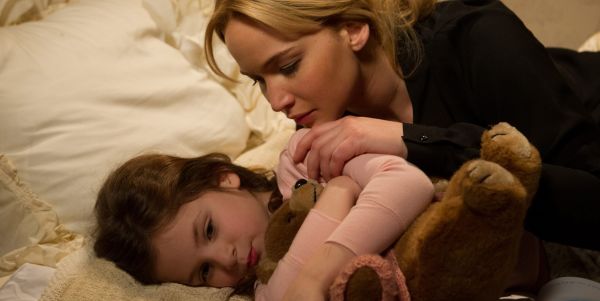JOY: A Joyless Experience

Alistair is a 25 year old writer based in Cambridge.…
Even though he has recently made a switch from being a controversially quirky indie darling to a critically adored awards favourite, David O. Russell’s storytelling obsessions have always been the same. He has always been drawn to stories about dysfunctional families and the things that either drive them apart, or bind them closer together, varying from extreme to extreme. His debut film Spanking the Monkey dealt with incest between parent and child, his “second coming” as an awards-bait director with The Fighter dealt with the disintegration of the family unit that comes twinned with finding success.
No matter whether he’s been writing for a more cult or mainstream sensibility, Russell has been keenly attuned to the interpersonal family dynamics of his characters, making the emotions seem believable no matter how contrived the circumstances.
Business as usual for Russell – tedium for the rest of us
With Joy, his third collaboration with recurring cast members Jennifer Lawrence, Bradley Cooper and Robert De Niro, he has made yet another entry into his pantheon of textbook familial dysfunction. The problem is this time he has made a film about dysfunction at its most functional; there are no dramatic conflicts in the character relationships, making this attempt at a biopic even less interesting.
With Russell’s love of quick-witted, eccentric characters, it wouldn’t be a stretch of the imagination to believe that Joy would manage to make a story about a woman inventing a new brand of mop dramatically engaging. Instead, he has made his most tedious film to date: a story with no clear reason to be given a cinematic adaptation, filled with characters who never become as interesting as Russell believes them to be.

Opening with a title card claiming the movie is “inspired by true stories of incredible women”, it becomes obvious Russell’s noble intentions were to make a boldly feminist movie about a woman rising up against all odds to become a success. Yet there is nothing remarkable about the title character, or at least nothing that makes it clear as to why she is the focus of a major motion picture.
The fact that the movie is a fictionalised account suggests Russell exaggerated many elements of her life in order to make it palatable as a dramatic feature; the problem is he didn’t exaggerate enough, leaving him to tread overly familiar ground in an uninteresting manner. The Joy of the title is Joy Mangano, portrayed by Lawrence, whose living situation is textbook Russell. After a failed marriage she is living with her daughter and her shut-in mother, whilst her father (now divorced to her mother) and ex-husband live miserably together in the basement.
If this situation screams like bad soap opera, that’s because it deliberately is; the awful daytime television her mother and aunt consume bleeding it to the overall conception of reality. Yet Russell stubbornly refuses to play it as the melodrama it clearly needs to be, despite surreal flights of fantasy ranging from mock-funerals to full-blown musical sequences.
Joy gets fired from her job as an air stewardess, deciding now to make money on her inventions. From there, the rags to riches tale is twinned with a less interesting account of getting the American public invested in a new brand of mop.

The film never becomes the feminist tract it urgently needs to be, never in possession of a sense of narrative urgency to make the story worth caring about. It is a mundane real-life story adapted in the most mundane manner; it is a sign of how middle-of-the-road Russell has become that he can’t even make fantasy sequences visually arresting.
A biopic with no narrative purpose
The film is at least slyly subversive when it comes to critiquing capitalism. Bradley Cooper plays an executive at the QVC shopping channel (yes, really), who is the sole executive at the network with any support for her product. The film clearly highlights that the inherent flaw of capitalism is not allowing success for many hard-working people, yet she is being thrown a lifeline by the very thing that is being condemned. It is a thesis as confused as anything else in the film. When the movie’s third act disappears down a rabbit-hole of increasingly uninteresting patent lawsuits, I was left confused as to what interest Russell had in this material.

A great biopic makes an uninteresting subject engaging, no matter how bland; a recent biopic that managed this effortlessly was David Fincher’s The Social Network, turning similar courtroom politics about patents and capitalism into the work of not just riveting drama, but high art. Not bad for a film about a social networking website.
Joy flirts with having similar ideas about self-made millionaires coming into collision with capitalist injustices, but ultimately it never becomes more than a film about a woman who made a mop. It’s ironic how a movie about a product that keeps things clean is so narratively messy.
The film’s failure could also be registered as fatigue with the increasing familiarity of the style of Russell 2.0. Instead of moving to levels beyond self-parody, this is a surprisingly restrained work from Russell, leaving me yearning for the zany melodrama that popularised his earlier films. All the elements that make it a distinctively Russell film are there, not least the characteristically unimaginative casting, but it doesn’t have the same collage of offbeat and screwball sensibilities that made his earlier films charming despite their flaws.
Conclusion
Joy is far from Joyful; with an uninteresting narrative, performances that feel drained of passion and a filmmaker caught between his roots and his new-found mainstream sensibility, it is an utter mess. Far from a catastrophe, but one that could easily be wiped clean from Russell’s filmography.
What are the least essential biopics? And which films were the biggest failures when it came to trying to be Oscar-bait?
Joy is out now in the US and on January 1 in the UK. All international release dates are here.
Does content like this matter to you?
Become a Member and support film journalism. Unlock access to all of Film Inquiry`s great articles. Join a community of like-minded readers who are passionate about cinema - get access to our private members Network, give back to independent filmmakers, and more.
Alistair is a 25 year old writer based in Cambridge. He has been writing about film since the start of 2014, and in addition to Film Inquiry, regularly contributes to Gay Essential and The Digital Fix, with additional bylines in Film Stories, the BFI and Vague Visages. Because of his work for Film Inquiry, he is a recognised member of GALECA, the Gay & Lesbian Entertainment Critics' Association.













